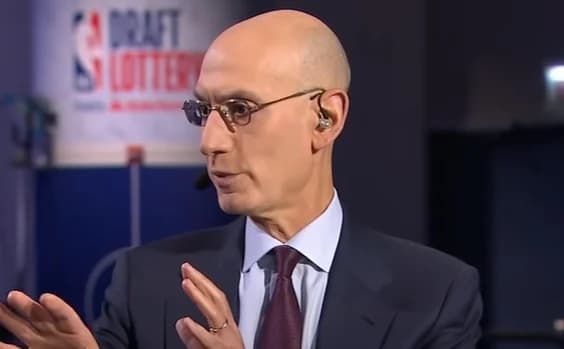NBA Commissioner Adam Silver Opens Up on Its Success and Controversies

NBA Commissioner Adam Silver found himself navigating the choppy waters of league policy and player welfare during a candid discussion with sports analyst Pat McAfee on The Pat McAfee Show. At the heart of the conversation was the hotly debated issue of load management, a contentious topic that has sparked a flurry of opinions and controversies across the basketball community.
Under the new Collective Bargaining Agreement (CBA), the NBA implemented a stringent load management rule stipulating that players must participate in a minimum of 65 regular-season games and play a minimum of 20 minutes per game to qualify for end-of-season awards—an initiative aimed at promoting consistency and fairness in the selection process. While hailed as a step in the right direction by many, the rule has faced its fair share of scrutiny and skepticism, particularly from players grappling with injuries and unforeseen setbacks.
In a candid exchange with McAfee, NBA Commissioner Adam Silver shed light on the league’s rationale behind the implementation of the new rule, citing a desire to enhance the integrity and prestige of NBA awards while ensuring that players are held to a standard of accountability and commitment to their teams and fans.
“Generally, it’s been positive,” remarked Silver, reflecting on the impact of the rule change. “We’ve seen a notable uptick in the number of games played by All-Star players compared to previous seasons, which underscores the effectiveness of our efforts to promote player availability and participation.”
However, the commissioner acknowledged the nuanced challenges and complexities inherent in the implementation of such a rule, particularly in cases where injuries and unforeseen circumstances threaten to derail a player’s eligibility for coveted end-of-season accolades. Silver revealed that conversations with former NBA stalwarts, including Andre Iguodala, had prompted introspection and reassessment of the rule’s efficacy in fostering a fair and equitable playing field for all athletes.
The specter of load management has cast a shadow over the NBA in recent years, prompting widespread debate and speculation about its impact on the sport’s integrity and fan engagement. With stars routinely sidelined to preserve their health and stamina for crucial matchups, fan interest has waned, leading to calls for a radical overhaul of the league’s scheduling format.
Enter Joe Dumars, the revered former Detroit Pistons star and current Head of Basketball Operations, whose impassioned advocacy for the preservation of the NBA’s 82-game season has emerged as a rallying cry against calls for reduction and reform. Commissioner Silver lauded Dumars’ unwavering commitment to the traditional ethos of the league, emphasizing the importance of maintaining the integrity and prestige of the 82-game format.
While the debate overload management rages on, Silver’s steadfast resolve and commitment to upholding the sanctity of NBA awards and the league’s storied traditions serve as a beacon of stability and assurance amidst the tumult of change and controversy. As the season unfolds and the race for postseason glory intensifies, the NBA finds itself at a crossroads, grappling with the age-old conundrum of balancing tradition with innovation in the relentless pursuit of excellence.





